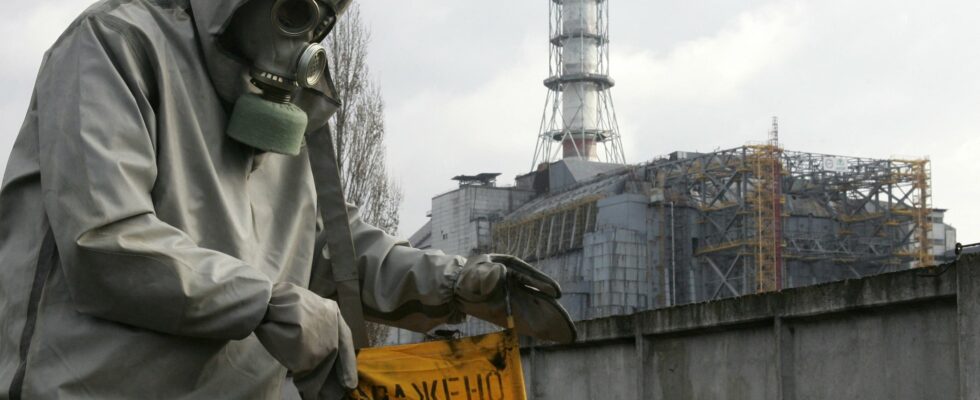The end of the Cold War had removed from the minds of Europeans the risk of apocalypse posed by nuclear weapons, which had long been part of their daily lives. Threats from the Russian President with the invasion of Ukraine have reintroduced it abruptly. This is not the only symptom of a shift into a new era. The Russian-American bipolarity is being challenged by China, whose arsenal continues to grow in opacity. New “endowed” powers are emerging: North Korea, already; Iran if it decides, and other states, tomorrow, if they see it as the only way to ensure their survival. In 1964, the director Stanley Kubrick titled his satirical film Dr. Strangelove: How I Learned to Stop Worrying and Love the BombThis “mad love” has taken over the world and complicates the game of powers.
Under heavy surveillance, a secure train crosses the border into Russia on June 1, 1996. On board, the most destructive weapon invented by man: an intercontinental missile nuclear warhead, capable of razing a large city. Ukraine has just transferred to its neighbor, to be dismantled, the last of the 1,900 strategic warheads in its possession. At the time of the collapse of the USSR, kyiv had the third largest atomic arsenal on the planet, including the 2,500 so-called “tactical” warheads – designed to strike targets over short distances – handed over to Russia in 1993.
Announced by Ukrainian President Leonid Kuchma, the event was welcomed by the White House. In return, Ukraine would become one of the main recipients of American financial aid for two years. On June 1, however, Yuri Kostenko felt a deep bitterness. “I had the feeling that everyone was deceiving us, not only Russia, but also the West,” confided this former deputy, Minister of Environmental Protection and Nuclear Safety from 1992 to 1998, and author of Nuclear disarmament of Ukraine, a history (Harvard University Press).
For this engineer by training, the transfers of warheads were rushed. Just like the signing, on December 3, 1994, of the Budapest Memorandum, which provided for Russia’s respect for the territorial integrity of Ukraine, in exchange for its renunciation of its nuclear arsenal. Kiev wanted the United States to provide it with security “guarantees.” These would have involved a commitment of American forces in the event of a violation of Ukrainian sovereignty. But Washington only obtained that the memorandum mention “assurances,” without constraint.
Ukrainians in favor of nuclear rearmament
Today, Ukraine is deeply regretful. “Nuclear disarmament was a historic mistake,” National Security and Defense Council Secretary Oleksandr Turchynov said after Russia’s annexation of Crimea in 2014. The February 24, 2022 invasion then shook even Bill Clinton. “I feel personally concerned because I convinced [les Ukrainiens] to give up its nuclear weapons, the American president confided. And none of them believe that Russia would have done this if Ukraine still had them.” A few months after the war began, 53% of Ukrainians said they supported nuclear rearmament, compared with 27% a decade earlier.
This “historical error” has several causes. The renunciation of nuclear weapons first had the advantage of anchoring Ukraine, which had barely left the USSR, on the international scene. Almost no one in Kiev then measured the strategic interest of keeping them to deter any potential aggressor. “In 1991, Ukrainian thinking on deterrence was deficient,” underlines Polina Sinovets, director of the Odessa Center for Non-Proliferation.
The country was also suffering a serious economic crisis – GDP in free fall, galloping inflation (4,700% in 1993), deficit – and could not do without Western aid. Faced with Ukraine, the United States was determined that after the breakup of the USSR there would be only one post-Soviet nuclear power, Russia. For its part, the Kremlin was putting pressure on kyiv, where “political mentalities were predominantly pro-Russian,” remembers Yuri Kostenko. Our leaders never thought that Russia would become our enemy.”
The Arbatov Plan
In fact, Moscow had given itself a road map on how to act, as soon as Ukrainian independence was proclaimed in August 1991. Yuri Kostenko discovered it in a memo written the following month by Georgy Arbatov, then the Kremlin’s international adviser on disarmament issues. This KGB insider recommended categorically refusing a “sharing” of nuclear weapons and pushing the former Soviet republics to give it up. “Behind the Arbatov plan, there was the calculation that a disarmed Ukraine would remain in the Russian sphere of influence,” believes Yuri Kostenko. “And that it would find itself alone facing Russia in the event of a dispute.”
In the United States, a man then has the intuition. In Foreign Affairsin 1993, John Mearsheimer, a researcher in international relations, called for “ensuring that the Russians, who have historically had bad relations with Ukraine, do not try to reconquer it.” And argued that “Ukrainian nuclear weapons are the only reliable means of deterring Russian aggression.” Of course, nuclear warheads were then controlled in Moscow and Ukraine could not launch its intercontinental missiles alone. But part of the USSR’s atomic military-industrial complex was located on its territory. “The first atomic bombs of the USSR had been developed here,” recalls Yuri Kostenko. “It was only a question of political will.”
Three decades later, some countries are still harboring the idea that only nuclear weapons can deter a potential aggressor who does have them. “North Korea, which already has them, and Iran, which could manufacture them, were already convinced that abandoning a nuclear program, as Iraq and Syria have done, would put them at the mercy of the major powers,” says Emmanuelle Maître of the Foundation for Strategic Research. “With the war in Ukraine, this signal is even stronger.”
Mentalities are changing. Today, it is better to be in NATO than outside it. Until now in favour of disarmament, Finland and Sweden justified their choice to join the Atlantic Alliance by access to the American nuclear umbrella. The upheaval of the nuclear order caused by Russia is only just beginning.
.
